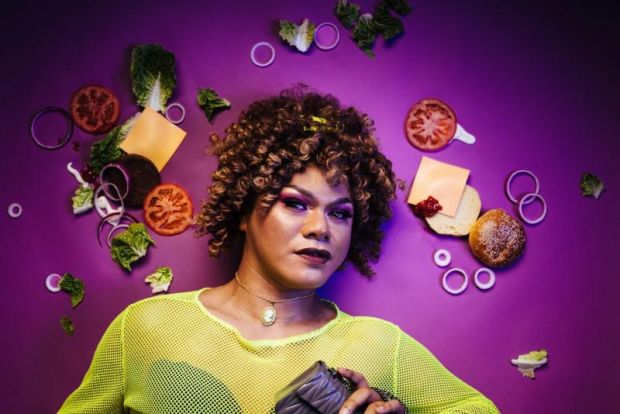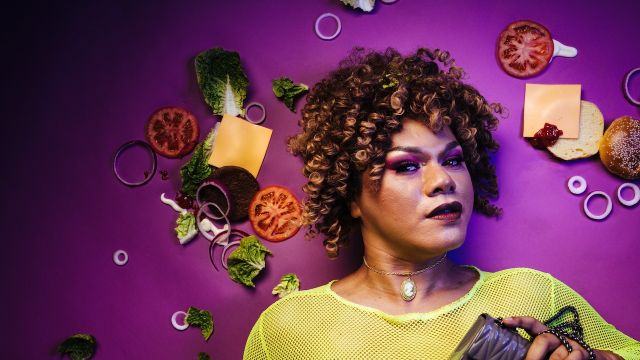Burgerz
It all began when a man in London threw a hamburger at playwright Travis Alabanza, accompanied by a transphobic insult. In a public place. But transexual phenomenon Kikki Temple makes us believe the play is her story, that it all happened, in Melbourne, to Kikki…
I won’t spoil her spectacular arrival on stage. We all got a WOW (!) shock but then Kikki’s fans (who seemed to make up most of the opening night audience) cheered, whistled and stomped in welcome. Kikki, thus far in a drab jump suit, acknowledged this as if it were merely her due and got down to business.
Burgerz is a full-frontal assault on the audience, a rambling monologue. It doesn’t all cohere; it goes off on tangents, its often funny, often hectoring, at times wry, despairing, and sometimes very pissed-off. There’s some recognisable Kikki schtick, some dancing (the Māori heritage is plain there), some flouncing, some singing and there’s a fascination with the thrown thing, the simple, basic hamburger.
How is a hamburger bun made? What shape must it be? What are the basic ingredients in a basic hamburger? How do you put them together (instructions drop from above)? But first, what is the correct box for a hamburger? And what kind of person throws a hamburger at another human being to whom they violently object and feel the need to vilify?
Kikki asks folks in the front row which they prefer, a burger or a hot dog. Another reference to binary choices. A stage manager wheels on an all-purpose cabinet: drinks fridge, cupboards, utensils, a stove top. Kikki recruits a volunteer from the audience, sits them on a stool, gives them a drink, and gets them to read the instructions aloud.

On opening night, this volunteer was a nice man called Mark, whom (I think) claimed his husband pushed him into it. At first, Mark was self-conscious and claimed to be nervous, but he relaxed and was quick, funny and quite up to some real and to-the-point interplay with Kikki. Mark and Kikki had some experiences and emotions in common. (Mark was so ideal that I figured he may’ve been a plant, but no matter: it was fun. Will the next ‘volunteer’ at the next performance be as good?) The volunteer reads the ‘instructions’ but they snag on a that question of the correct box. The metaphor is clear. Where does the burger fit? Is there only one box?
Things proceed. The meat is minced. Tomato sliced. Mark chops the onion and adds spice to the patty… Lots of spice. Lots more spice. Kikki cooks the patty. Kikki slices the bun. ‘Oh, no – it’s not straight!’ Slurps on mayonnaise. Etc. The assembled burger sits there… In its box. And we may think, ‘Why are we watching this?’
What begins as an extended metaphor with that emphasis on the correct box for a hamburger, segues into a cry of rage – but complicated and deepened when, in the description of the incident, there is something else: a moment’s eye contact between the man who threw the burger and the transexual person who copped it. Was that shame or regret in his eyes? What need was met by his actions? What did he think or feel after his actions? There were a hundred witnesses who did nothing – except for one woman across the street. She saw – and then she looked down at the ground. She knew. She was us – complicit. She connected – for an instant – and then had to look away.
For me, these reflective layers on the catalytic incident are among the most powerful elements in Burgerz because they question the incident beyond transphobia. Where does this hatred come from? And what is it like to be its object? And why do so many go along?

Comparisons may be odious, but I was reminded of another of this year’s Midsumma shows: The Gospel According to Jesus, Queen of Heaven. There is a show that asks for change, just as aware of cruelty, prejudice and violence, but sans outrage, coherent, strangely moving – and persuasive, reaching beyond the already converted.
Here, the same director, Kitan Petkovski, has a very different beast on his hands and what can he do but trust the text – and Kikki? Katie Stetkidis’ lighting is, by the way, excellent as is Rachel Lewindon’s sound design.
Kikki’s amazing presence and force of personality carry us over the feeling that although Travis Alabanza’s emotions are real, their show is a bit made-up-as-it-goes-along. As if emotion overwhelmed craft and therefore Kikki’s comedy/diatribe/rave is unfocussed. On reflection, the burger metaphor seems more than a little strained and doesn’t really work. But it is, as the program note has it, ‘like nothing you’ve seen before’.
Michael Brindley
Photographer: Morgan Roberts
Subscribe to our E-Newsletter, buy our latest print edition or find a Performing Arts book at Book Nook.

